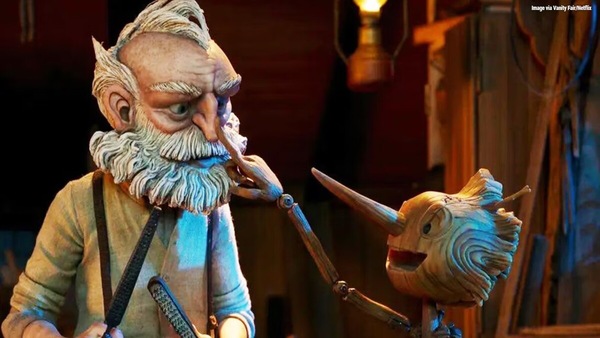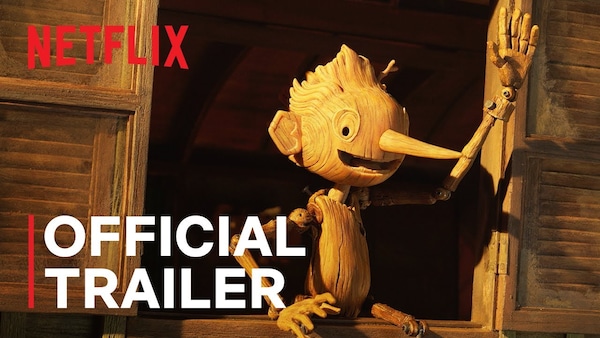Guillermo del Toro's Pinocchio movie review: A story of acceptance that is a delightful retelling of a classic tale
Ewan McGregor, David Bradley, Gregory Mann and Tilda Swinton voice the main characters in Oscar winner Guillermo del Toro’s retelling of the classic tale of Pinocchio

Guillermo del Toro's Pinocchio
Last Updated: 02.35 PM, Feb 26, 2024
Story: In early 1900s war-torn Italy, Geppetto (David Bradley), a talented craftsman, lives a happy, content life with his 10-year-old son Carlo (Gregory Mann). The entire town admires the father-son duo, who they call ideal Italian citizens. Geppetto’s world is shattered when Carlo is killed in a bomb attack. Geppetto becomes a reclusive alcoholic. One night, angry that even after several pleadings his beloved son is not returned to him, Geppetto chops up the pine tree he planted in Carlo’s memory and makes a puppet out of it. The puppet is brought to life by the spirit Wood Sprite (Tilda Swinton), who wants to bring joy back into Geppetto’s life. The living, breathing and talking puppet, Pinocchio (also Gregory Mann), goes through several adventures in his tryst to find acceptance for who he is, in a world where he is constantly being told to obey and to conform to fundamentalists ideas. Pinocchio loves Geppetto and everything in his world from the word go, but Geppetto takes his time to accept Pinocchio, for he is constantly trying to find Carlo in him. In the end, father and son (Geppetto and Pinocchio) are ready to sacrifice everything for the sake of their love, and in the process, help others around them realise what true love is and why it is important to see people for who they really are.
Review: Oscar-winning Mexican filmmaker Guillermo del Toro’s work is marked by fairy tales and horror, and he brings his trademark style to a retelling of Carlo Collodi's 19th-century fable of Pinocchio. The film has all the elements that del Toro is celebrated for — monsters, symbols of power, Catholicism, the underworld, insectile imagery and, most important to this story, the celebration of imperfection. This is why choosing the tale of Pinocchio works wonderfully for his animation debut.
While del Toro has retained characters from the original tale, such as the cricket, he has given them an interesting and relatable twist. The story of the film is narrated by a cricket named Sebastian J. Cricket (Ewan McGregor),a writer who is entrusted by Wood Sprite (a spirit used in place of the Blue Fairy from the original story) to guide and take care of Pinocchio.
One gets to see some real, flawed father-son relationships through Geppetto and Pinocchio, and Podesta (Ron Perlman), a government agent, and his son Candlewick (Finn Wolfhard), who is constantly trying to win his father’s approval and acceptance. Geppetto isn’t instantly overjoyed when he sees Pinocchio come to life. There is disbelief, then difficulty to accept Pinocchio, who is polar opposite to Carlo. He is even shown as being annoyed by Pinocchio’s seemingly endless innocent questions since everything in his new-found life is new to Pinocchio.
While the original story of Pinocchio is about being truthful, this one doesn’t harp on too much about Pinocchio and his growing nose. Instead, it is a story of acceptance and throws light on what one considers to be good and correct, and how that can weigh heavily on a person and their relationships.
An interesting concept that del Toro uses is to make Pinocchio immortal till the end, and he even takes the audience through a journey that the puppet boy goes through after being killed a few times. Pinocchio has to spend a specific amount of time with Death (Wood Sprite's sister, also voiced by Tilda Swinton) in a different realm before he can be sent back to the living world; Pinocchio can’t die since he has a borrowed spirit. In between his different lives, Pinocchio has some enlightening conversations with Death about the real meaning of life and the important role that death plays.
Guillermo del Toro highlights greed, exploitation, fascism, religion and relationships through Pinocchio and his many adventures, which all originates with his need to be accepted for who he is. Pinocchio is constantly told to ‘obey’, but since he doesn’t have any human context to what that means and only knows how to be who he really is, Pinocchio literally pays the price with his life more than just once. In the process, he manages to show the mortals around him the true meaning of love and life.
There are several trials and tribulations before Geppetto and Pinocchio can live their happily ever after, but unlike other fairy tales, this one has a real-life ending. Death is shown as a beautifully accepted part of life, and something that doesn’t have to be tragic. Pinocchio, who by the end of the film becomes mortal, lays to rest all the people that he loves, and yet continues to have a happy, fulfilled life. One can’t help but fall in love with Pinocchio, and at the same time, connect with Geppetto and his very human emotional journey as a father.
The animation in the film deserves a special mention. It is so well executed that one can easily forget that it is stop-motion animation, where objects are physically manipulated in each frame. Reality finds its way in the features of the characters as well. Geppetto looks every bit a recluse, bitter drunkard, with sunken, dull eyes and frazzled hair. Pinocchio, who is made in a drunken rage, is put together haphazardly and continues to look that way throughout the film — with one ear missing, bolts sticking out of his shoulders, a snowman-like nose and an uneven smile. He isn’t clothed either, and even at the end, when he becomes ‘a real boy’, Pinocchio’s look doesn’t change.

Verdict: At almost two-hours-long, the film seems a tad long and some portions don’t add as much to the tale as the others, but Guillermo del Toro's Pinocchio is certainly worth a watch, especially in the current season that is about all things family. The tale of Pinocchio has been retold many times through the years, and this is perhaps the finest retelling of the classic children’s tale, which, del Toro shows, holds significance for adult viewers as well. Watch this film with a warm mug of hot chocolate, as you snuggle in with your kids.
WHERE
TO WATCH
Subscribe to our newsletter for top content, delivered fast.
